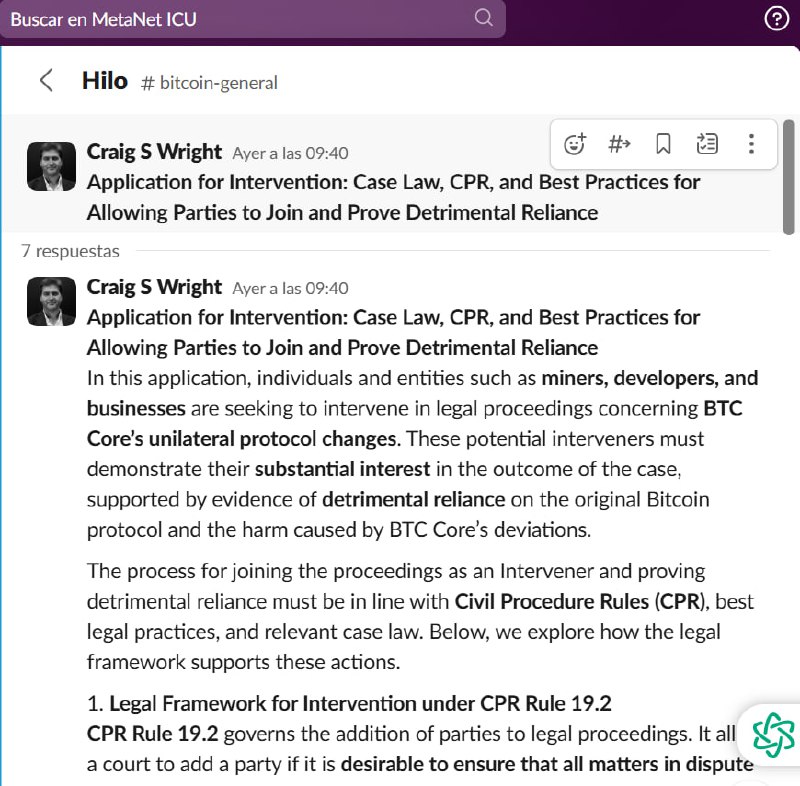tg-me.com/CSW_Slack/6700
Last Update:
Application for Intervention: Case Law, CPR, and Best Practices for Allowing Parties to Join and Prove Detrimental Reliance
Craig S Wright
Ayer a las 09:40
Application for Intervention: Case Law, CPR, and Best Practices for Allowing Parties to Join and Prove Detrimental Reliance
In this application, individuals and entities such as miners, developers, and businesses are seeking to intervene in legal proceedings concerning BTC Core’s unilateral protocol changes. These potential interveners must demonstrate their substantial interest in the outcome of the case, supported by evidence of detrimental reliance on the original Bitcoin protocol and the harm caused by BTC Core’s deviations.
09:40
The process for joining the proceedings as an Intervener and proving detrimental reliance must be in line with Civil Procedure Rules (CPR), best legal practices, and relevant case law. Below, we explore how the legal framework supports these actions.
09:40
1. Legal Framework for Intervention under CPR Rule 19.2
CPR Rule 19.2 governs the addition of parties to legal proceedings. It allows a court to add a party if it is desirable to ensure that all matters in dispute can be fully adjudicated. This is key for potential Interveners in this case because they hold substantial and legitimate interests in the outcome, particularly based on financial and operational harm they’ve suffered due to BTC Core's protocol changes.
Criteria for Adding Parties under CPR 19.2:
Necessary to Resolve the Issues: The court can add parties if their participation is necessary for the full resolution of the case. The involvement of miners, developers, and businesses is critical to fully understanding the scope of harm caused by BTC Core's changes.
Desirable for Justice: The court must consider whether the inclusion of the Interveners is desirable for justice. Here, justice requires a complete picture of how BTC Core’s actions have harmed key players in the Bitcoin ecosystem.
In R (on the application of Greenpeace Ltd) v Secretary of State for Trade and Industry [2007] EWHC 311 (Admin), the court laid out factors to consider when adding third parties, including the nature of the intervener's interest, potential prejudice to existing parties, and the broader interests of justice. Applying these principles to this case, potential Interveners must prove:
A direct and substantial interest in the outcome of the case.
That their participation is crucial to presenting all the facts and ensuring that the court reaches a fair decision.
09:41
2. Establishing Detrimental Reliance and Financial Harm
To be included as parties, Interveners must provide evidence of detrimental reliance on BTC Core’s assurances about the immutability of the Bitcoin protocol. Detrimental reliance refers to situations where a party reasonably relies on a promise or representation to their detriment. In this case, miners, developers, and businesses relied on BTC Core’s earlier assurances that the protocol would remain unchanged, only for it to be altered unilaterally.
The principle of detrimental reliance is well-established in Crabb v Arun District Council [1976] Ch 179, where the court held that a party who suffers detriment based on a clear promise is entitled to relief when the promise is later withdrawn. The Interveners must provide evidence that BTC Core’s assurances were clear and unequivocal, and that they made financial investments or operational decisions in reliance on these assurances.
What the Interveners Must Prove:
Proof of Assurances: Interveners must demonstrate that BTC Core’s assurances regarding the immutability of the protocol were publicly made and relied upon. This can include developer communications, public statements, or protocol documentation where BTC Core indicated that the protocol was "set in stone.".
1/3
CSW
Oct 23, 2024
https://metanet-icu.slack.com/archives/C5131HKFX/p1729669200147329
https://www.tg-me.com/us/CSW Slack Channel/com.CSW_Slack/6699
BY CSW - Slack Channel

Share with your friend now:
tg-me.com/CSW_Slack/6700
